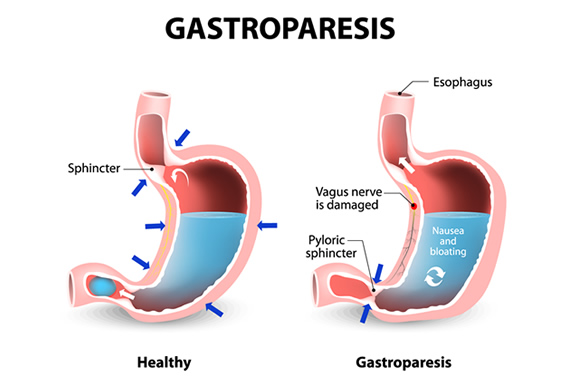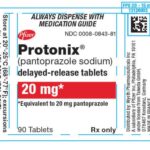Can Omeprazole Cause Gastroparesis?

What is gastroparesis?
Gastroparesis, which means partial paralysis of the stomach, is a disease in which the stomach cannot empty itself of food in a normal way. If you have this condition, damaged nerves and muscles don’t function with their normal strength and coordination slowing the movement of contents through your digestive system.
This is a common condition in people who have had diabetes for a long time, but it may also occur in other situations. Gastroparesis can be misdiagnosed and is sometimes mistaken for an ulcer, heartburn or an allergic reaction. In non-diabetic people, the condition may relate to acid reflux.
What is Omeprazole?
Omeprazole, sold under the brand names Prilosec and Losec among others was first made in 1979 by Swedish AB Hässle, part of Astra AB. It was the first of the proton pump inhibitors (PPI). Astra AB, now AstraZeneca, launched it as an ulcer medicine under the name Losec in Sweden. It was first sold in the United States in 1989 under the brand name Losec.
Omeprazole is used to treat certain conditions where there is too much acid in the stomach. It is used to treat gastric and duodenal ulcers, erosive esophagitis, and gastroesophageal reflux disease (GERD). GERD is a condition where the acid in the stomach washes back up into the esophagus. Sometimes, omeprazole is used in combination with antibiotics (eg, amoxicillin, clarithromycin) to treat ulcers associated with the infection caused by the H. pylori bacteria.
Omeprazole is also used to treat Zollinger-Ellison syndrome, a condition where the stomach produces too much acid. Omeprazole is also used to treat dyspepsia, a condition that causes sour stomach, belching, heart burn, or indigestion.
In addition, omeprazole is used to prevent upper gastrointestinal tract bleeding in seriously ill patients. Omeprazole is a proton pump inhibitor (PPI). It works by decreasing the amount of acid produced by the stomach.
How should omeprazole be used?
Prescription omeprazole comes as a delayed-release (releases the medication in the intestine to prevent break-down of the medication by stomach acids) capsule, and packets of delayed-release (releases the medication in the intestine to prevent break-down of the medication by stomach acids) granules for suspension (to be mixed with liquid) to take by mouth or give through a feeding tube. Nonprescription (over-the-counter) omeprazole comes as a delayed-release tablet to take by mouth. Prescription omeprazole should be taken at least 1 hour before a meal. Prescription omeprazole is usually taken once a day before a meal but may be taken twice a day when used with other medications to eliminate H. pylori, or up to three times a day, before meals when used to treat conditions in which the stomach produces too much acid.
The nonprescription delayed-release tablets are usually taken once a day in the morning at least 1 hour before eating for 14 days in a row. If needed, additional 14-day treatments may be repeated, not more often than once every 4 months. To help you remember to take omeprazole, take it at around the same time(s) every day. Follow the directions on your prescription label or the package label carefully, and ask your doctor or pharmacist to explain any part you do not understand. Take omeprazole exactly as directed. Do not take more or less of it or take it more often or for a longer period of time than prescribed by your doctor or stated on the package.
If you are taking the delayed-release tablets, swallow them whole with a full glass of water. Do not split, chew, or crush them or crush and mix them into food.
Swallow the delayed-release capsules whole. If you have difficulty swallowing the delayed-release capsules, place one tablespoon of soft, cool applesauce in an empty bowl. Open the delayed-release capsule and carefully empty all the granules inside the capsule onto the applesauce. Mix the granules with the applesauce and swallow the mixture immediately with a glass of cool water. Do not chew or crush the granules. Do not store the applesauce/granule mixture for future use.
If you are taking the granules for oral suspension, you will need to mix it with water before use. If you are using the 2.5-mg packet, place 1 teaspoonful (5 mL) of water in a container. If you are using the 10-mg packet, place 1 tablespoonful (15 mL) of water in a container. Add the contents of the powder packet and stir. Wait 2 to 3 minutes to allow the mixture to thicken, and stir the mixture again. Drink the entire mixture within 30 minutes. If any of the mixture is stuck to the container, pour more water into the container, stir and drink all the mixture immediately.
The granules for oral suspension can be given through a feeding tube. If you have a feeding tube, ask your doctor how you should take the medication. Follow the directions carefully.
Do not take nonprescription omeprazole for immediate relief of heartburn symptoms. It may take 1 to 4 days for you to feel the full benefit of the medication. Call your doctor if your symptoms get worse or do not improve after 14 days or if your symptoms return sooner than 4 months after you finish your treatment. Do not take nonprescription omeprazole for longer than 14 days or treat yourself with omeprazole more often than once every 4 months without talking to your doctor.
Continue to take prescription omeprazole even if you feel well. Do not stop taking prescription omeprazole without talking to your doctor. If your condition does not improve or gets worse, call your doctor.
Can omeprazole cause gastroparesis?
Yes, studies have shown that proton-pump inhibitors (PPIs) like omeprazole can cause gastroparesis. Reports indicate that, daily doses of 20–40 mg has been shown to significantly delay gastric emptying. Up to 40% of gastroesophageal reflux disease (GERD) patients may have associated gastroparesis or delayed gastric emptying.
For some people, gastroparesis affects the quality of their life, but is not life-threatening. They might be unable to complete certain activities or work during flare-ups. Others, however, face potentially deadly complications.
What other side effects can omeprazole cause?
Get emergency medical help if you have signs of an allergic reaction to omeprazole: hives; difficulty breathing; swelling of your face, lips, tongue, or throat.
Stop using this medicine and call your doctor at once if you have:
- severe stomach pain, diarrhea that is watery or bloody;
- new or unusual pain in your wrist, thigh, hip, or back;
- seizure (convulsions);
- kidney problems – fever, rash, nausea, loss of appetite, joint pain, urinating less than usual, blood in your urine, weight gain;
- low magnesium – dizziness, irregular heartbeats, feeling jittery, muscle cramps, muscle spasms, cough or choking feeling; or
- new or worsening symptoms of lupus – joint pain, and a skin rash on your cheeks or arms that worsens in sunlight.
Taking omeprazole long-term may cause you to develop stomach growths called fundic gland polyps. Talk with your doctor about this risk.
If you use this medicine for longer than 3 years, you could develop a vitamin B-12 deficiency. Talk to your doctor about how to manage this condition if you develop it.
Common omeprazole side effects may include:
- cold symptoms such as stuffy nose, sneezing, sore throat (especially in children);
- fever (especially in children);
- stomach pain, gas;
- nausea, vomiting, diarrhea; or
- headache.
This is not a complete list of side effects and others may occur. Call your doctor for medical advice about side effects. You may report side effects to FDA at 1-800-FDA-1088. You can find useful information on: Can Omeprazole Mess With Your Period?





